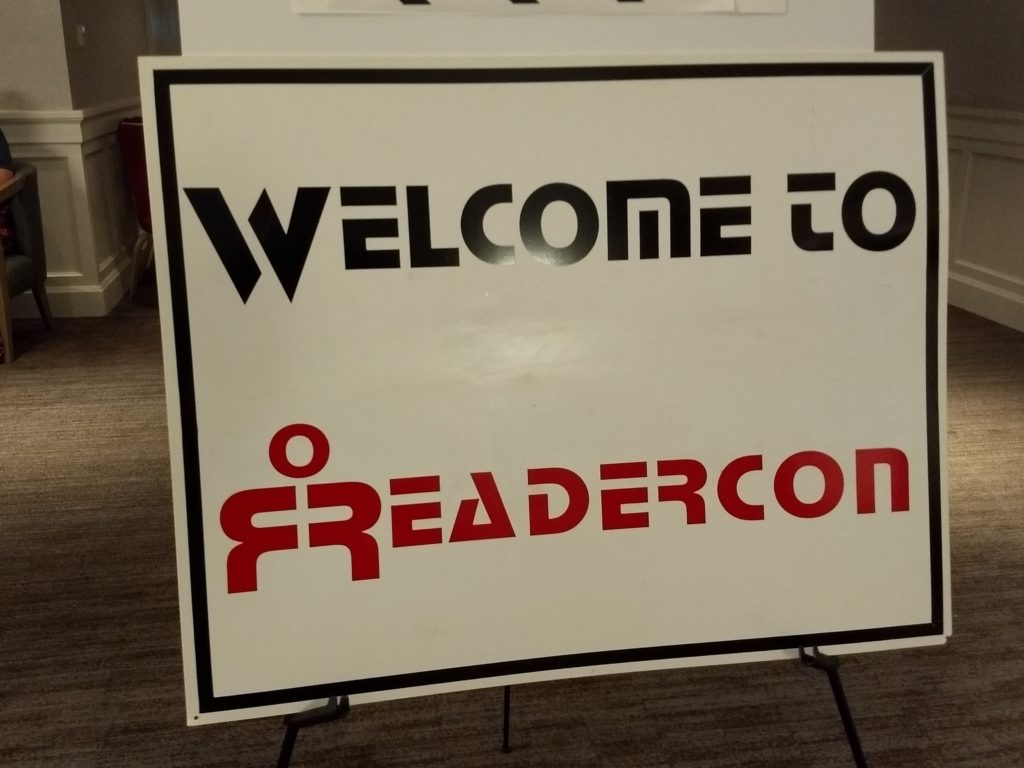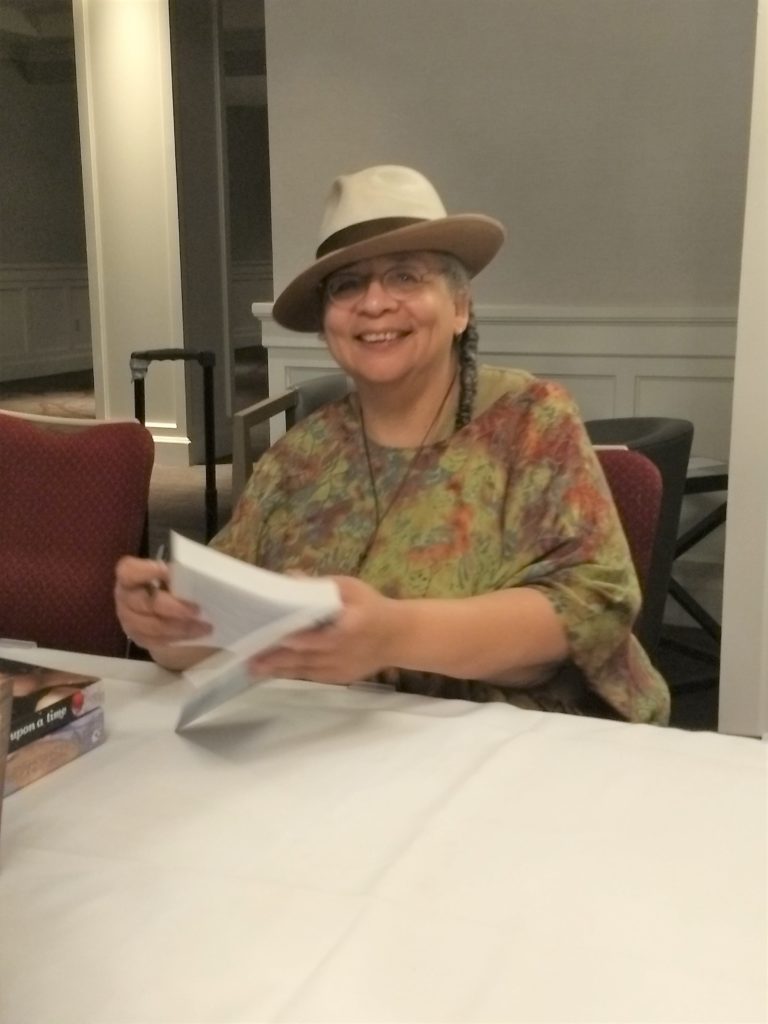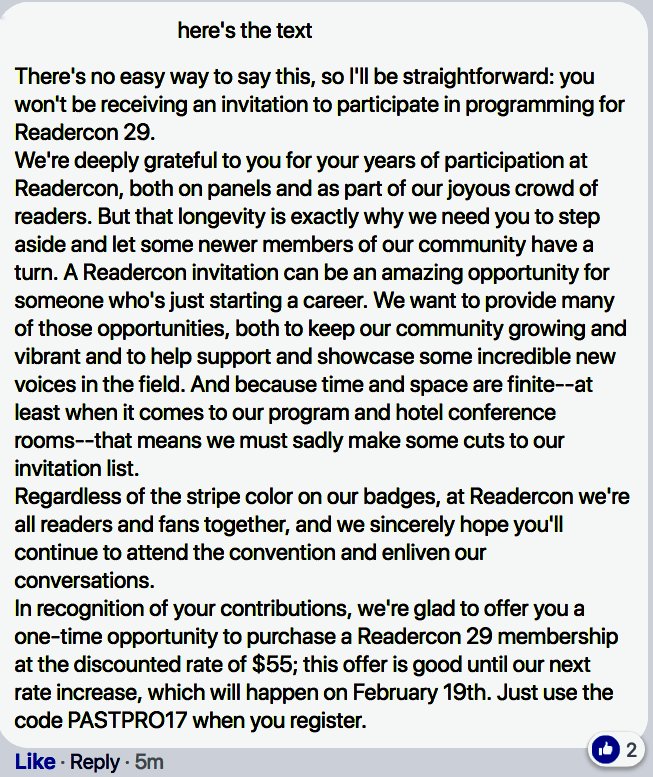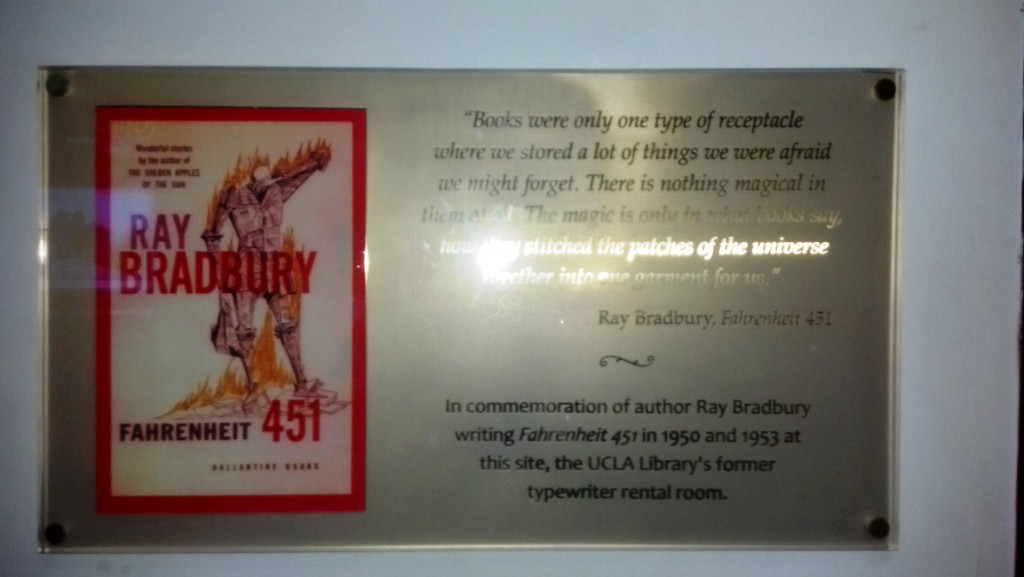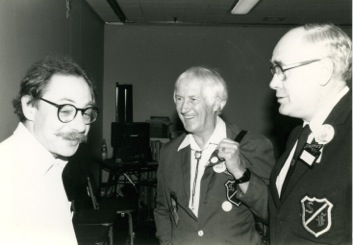(1) ARISIA BACK IN THE WESTIN. The convention website indicates Arisia 2020 will return to the Westin Boston Waterfront, from January 17-20, 2020.
(2) READERCON. Kate Nepveu compiled a great set of panel notes about the Readercon panel “Translation and Embedded Assumptions” with Anatoly Belilovsky, John Chu, Neil Clarke, Pablo Defendini, Tamara Vardomskaya (mod).
Neil: is publishing translations without being able to read original, has to count on team of people. So a lot of these granular issues settled before comes to, but not always. It’s interesting when there’s an American in the translated story . . . who is not always that American. They try to get the spirit of story across, so often work extra with the translators on that situation. Has edited bilingual anthology of Chinese SF, two volumes published in China, not been able to get published in U.S.
Tamara: gives example from Ada Palmer, in whose books gender is outlawed: everyone uses “they” (except narrator) to signal that progressive viewpoint has won. Polish translator said, in Polish that’s the conservative position, the progressive is to give high visibility to female existence (e.g., “waitress and waiter”, not “server”). Ada went with political connotation rather than word-for-word….
(3) SHINY. Nature’s David Seed delves into “Two millennia of lunar literature”:
The Moon’s luminous, cratered face, visible to the naked eye, has sparked the imaginations of writers and scientists for centuries with much proto-science fiction…
This included the second-century Syrian satirist Lucian of Samosata, whose A True Story is often cited as the first science-fiction narrative….
But Greek the biographer Plutarch’s Moralia (ad 100) is arguably the first such narrative to introduce scientific ideas…
Lunar literature began to crystallize in the ferment of the Renaissance, and to surge in the seventeenth century…
(4) TRUE CONFESSIONS. At American Magazine, Tom Deignan asks “Why do Catholic priests keep popping up in sci-fi?”
This month, Simon & Schuster will reissue a short story collection entitled The Toynbee Convector, by science fiction master Ray Bradbury, best known for classics like Fahrenheit 451 and The Martian Chronicles. First published in 1988, The Toynbee Convector features 23 stories, among them “Bless Me, Father, for I Have Sinned,” about a priest who hears a chilling confession on a snowy Christmas Eve.
That story—as well as countless other science fiction classics published over the centuries—raises an intriguing question: Why do priests and other religious figures play such an important role in the fantastic worlds and futuristic dystopias conjured by a wide range of sci-fi writers?
(5) SPACE INVADERS. The Alien Party Crashers official trailer has dropped.
In the style of Shaun Of The Dead, The Lost Boys and Attack the Block, this is a funny, dark and action packed sci-fi horror comedy that pits a group of drunken friends on New Years Eve in a Welsh valley against an invasion task force of creepy time-traveling aliens. A kick-ass M.O.D agent, an insecure radio DJ and a kung fu master who owns the local B&B learn their new years resolution this year is simple: STAY ALIVE.”
(6) HEAR WRITERS’ THOUGHT PROCESSES. Authors Marshall Ryan Maresca, Alexandra Rowland, and Rowenna Miller have started a podcast called World Building for Masochists, Downloadable at the website, transcripts also available. They have two episodes out so far. The first, “Playing God in Your Spare Time” includes this exchange:

ROWENNA: …I think that I start thinking about the character first, and what are they encountering, what do they have for breakfast, what do they see when they go out of their door in the morning, and there might be things that the character doesn’t know about their world. I think, you know, like you, Marshall, I started the story in a city, and my character actually doesn’t know very much about what’s going on outside of that city; she’s never been outside of it. So there’s kind of a freedom there for her to be ignorant, and it was kind of weird for me at first to be like, okay, there are things that I might know, but I need to keep that shoved aside, because there’s no reason for her to know what this other city would look like, or what the patterns of trade are between, you know, these two coastal towns. She’s never been there, she has no idea.
MARSHALL: But she might have, say, heard the name, and has her own preconceived notions of what it’s supposed to be.
ALEXANDRA: And I think that having a character with some degree of ignorance can also be a really useful tool for you as an author, because then you can — and I’m going to keep bringing this up because it’s my favorite trick of all time to use — you can sort of build a negative space and invite your character to make assumptions about the world, and also invite the reader to make assumptions about the world…
We’re keeping an eye out for the arrival of “World Building for Sadists,” too.
(7) HEAR IT MEOW? “Do critics think Lion King is a ‘roaring success’?” – BBC has compiled their reactions.
Disney’s Lion King remake, starring Donald Glover and Beyonce, has been described equally by pun-tastic critics as both a “roaring success” and “tame”.
The original 1994 animation won two Oscars for best music and score, while the stage version is also Broadway’s top grossing musical.
…In a four-star review, The Telegraph said “the power of this new Lion King comes from the outside”.
…The Guardian, were less impressed with the film, writing the “deepfake copycat ain’t so grrreat.”
(8) STRANGER THAN EVER. The Hollywood Reporter brings word that “Nielsen Confirms ‘Stranger Things’ Season 3 Is a Big Hit”.
Netflix has said that Stranger Things amassed a bigger audience over its first four days than any other original show in its history. New data from Nielsen shows that a lot of people did, in fact, spend the July 4 holiday weekend watching the series.
Per the ratings service’s SVOD content ratings, the eight episodes of Stranger Things 3 had an average minute audience — the closest approximation for streaming shows to Nielsen’s average viewership on linear TV — of 12.8 million viewers over its first four days of release. That’s a 21 percent increase over the same time frame after the release of season two in October 2017 (10.6 million)
(9) AFTER THE KING RETURNED. Paul Weimer is back to discuss a Robin Hood-themed novel in “Microreview [book]: Brightfall, by Jaime Lee Moyer” at Nerds of a Feather.
The other characters in the novel, human and otherwise, are the strength, power and richness of the novel. Beyond Marian herself, Robin comes off as a prat at first, someone to intensely dislike and hate because of his abandonment of Marian. The reasons how and why he did so, and his ultimate connection with the unraveling of the plot, humanize him to a degree, but the writer’s and reader’s intended sympathy comes off the page intended for Marian. Even by the end of the novel, I still thought he was a prat for his actions, even if I ultimately understood the how and why of them by the end of the novel.
(10) TODAY’S BIRTHDAYS.
[Compiled by Cat Eldridge.]
- Born July 13, 1904 — Norvell W. Page. Chief writer of The Spider pulp series as Grant Stockbridge. He started out by writing a backup story in the first issue of The Spider pulp: “Murder Undercover” and by the third issue was writing the main Spider stories which he did for some seventy stories. He also wrote The Black Bat and The Phantom Detective pulps. (Died 1961.)
- Born July 13, 1937 — Jack Purvis. He appeared in three of director Terry Gilliam’s early fantasy films, with roles in Time Bandits, The Adventures of Baron Munchausen and Brazil. He’s in three of the Star Wars films, the only actor he says to play three different roles, and he’s also in Wombling Free (based on The Wombles, a UK Children’s series), The Dark Crystal and Willow. (Died 1997)
- Born July 13, 1940 – Sir Patrick Stewart, 79. If you count The Avengers as genre (and I certainly do), his first SF role was as a man walking in from the sea in “The Town of No Return” episode. Setting aside Trek, other memorable genre roles include Leodegrance in Excalibur, Gurney Halleck in Dune, Prof. Macklin in The Doctor and the Devils, Charles Xavier in the X-Men franchise and he’s played Macbeth myriad times in the theatre world.
- Born July 13, 1942 — Mike Ploog, 77. He’s a storyboard and comic book artist, as well as a visual designer for films. his work on Marvel Comics’ Seventies Man-Thing and The Monster of Frankenstein series are his best-known undertakings, and as is the initial artist on the features Ghost Rider, Kull the Destroyer and Werewolf by Night. He moved onward to storyboarding or other design work on films including John Carpenter’s The Thing, Little Shop of Horrors, The Dark Crystal, Labyrinth and The Storyteller series.
- Born July 13, 1942 — Harrison Ford, 77. His best films? Raiders of The Ark, Star Wars and Blade Runner. Surely that’s not debatable. His worst film? Indiana Jones and the Kingdom of the Crystal Skull. Equally not debatable.
- Born July 13, 1955 — David J. Schow, 64. Mostly splatterpunk horror writer of novels, short stories, and screenplays. (He’s oft times credited with coining the splatterpunk term.) His screenplays include The Crow and Leatherface: The Texas Chainsaw Massacre III. He’s also done scripts for Masters of Horror, Perversions of Science and The Outer Limits. As an editor, he’s did the very impressive three-volume collection of Robert Bloch fiction, The Lost Bloch.
- Born July 13, 1953 – Chip Hitchcock, 66. A conrunner who co-chaired the 1999 World Fantasy Convention with his wife, Davey Snyder, he also has worked Worldcons as a Division Head, and chaired Bosklone, Lexicon 7 and Boskone 24. He was made a Fellow of NESFA in 1979. Other fannish credits include book editing, Worldcon floor plans, and producer of fannish theatricals.
- Born July 13, 1966 — David X. Cohen, 53. Head writer and executive producer of Futurama. Cohen is a producer of Disenchantment, Matt Groening’s fantasy series on Netflix. He also wrote a number of the “Treehouse of Horror” episodes on the Simpson’s which have a strong genre slant such as “Treehouse of Horror VII” (“Citizen Kang”).
- Born July 13, 1981 — Monica Byrne, 38. Her debut novel The Girl in the Road which is I’ve added to my reading list as it sounds fantastic which won the 2015 James Tiptree, Jr. Award and was also nominated for the Locus and Kitschies awards. She also had an essay in Wired back four years ago, “Hey, Book World: Sexism is Way Bigger Than the Hugos”, commenting on the Sad Puppies. It’s interesting reading still. And this essay, “Literature Still Urgently Needs More Non-White, Non-Male Heroes”, certainly shows where she is ideologically.
(11) COMICS SECTION.
- Rhymes With Orange shows an unexpected source wants to comment on a family purchase.
(12) IN THIS DICTIONARY, HIS PICTURE REALLY IS RIGHT NEXT TO THE WORD. For reasons you can now guess, Sir Patrick Stewart figures in the entry for the Wikitionary word of the day for July 13, 2019: “calvous”.
(13) UNDER THE LID. Alastair Stuart’s “The Full Lid 12th July 2019” stops “in at Centerville for Jim Jarmusch’s deeply strange The Dead Don’t Die, which may be the oddest horror movie you’ll see this year. It’s certainly, along with Midsommar, one of the most interesting. Also on deck this week is Greg van Eekhout’s startlingly good middle-grade SF novel Cog and the always excellent ZoomDoom Stories continue to impress with season one of The Six Disappearances of Ella McCray.”
The Dead Don’t Die
The best way to spot a Jim Jarmusch movie is to throw a dart, blindfold, at a wall of ideas. He’s done existential westerns (Dead Man), anthologies about taxi drivers (Night on Earth), a documentary about The Stooges (Gimme Danger) and the best hip-hop/samurai/film noir movie ever made (Ghost Dog: Way of the Samurai). Now, he’s turned his attention to horror comedy and the result is so inherently Jarmuschian it basically breaks the meter and embeds the needle in the wall of the lab. Where, I can only assume, Bill Murray stares at it for a moment, goes…’Huh’ and then continues about his day.
(14) SHALL WE DANCE?
(15) WHEN I’M ’64. Galactic Journey’s Jessica Holmes is fascinated by the new Doctor Who series – in 1964: “[July 12th, 1964] Mind Over Matter (Doctor Who: The Sensorites [Part 1])”.
Can I admit to something silly? I am a little bit scared of mind-readers. Don’t get me wrong, I don’t actually believe in telepaths. Then again, who knows what sort of freaky experiments certain entities get up to.
I just think the idea of someone reading my mind, or even manipulating it, is one of the most horrifying concepts out there.
And it looks like Doctor Who agrees with me.
(16) CHESS PLAYER CHEATED IN TOILET. I saw ESPN’s headline and I said to myself, that’ll get some clicks. They sourced their post from this Chess.com story:
GM Igors Rausis is under investigation for cheating after he was caught with his phone during a game at the Strasbourg Open. The 58-year-old Latvian-Czech grandmaster had raised suspicions after he increased his rating in recent years to almost 2700.
During an open tournament July 10-14 in Strasbourg, France, a phone was found in a toilet that had just been used by Rausis. He later signed a declaration that the phone was his.
Whether he was using his phone to get assistance from a chess engine is not clear at the moment.
In a comment to Chess.com, Rausis said:
“I simply lost my mind yesterday. I confirmed the fact of using my phone during the game by written [statement]. What could I say more? Yes, I was tired after the morning game and all the Facebook activity of accusers also have a known impact. At least what I committed yesterday is a good lesson, not for me—I played my last game of chess already.“
…Six years ago, in May 2013, [Rausis’] rating was still 2518, and it had fluctuated around the 2500 mark for at least 10 years. It has since increased by almost 200 points.
Over the last six years, Rausis increased his rating steadily as he mostly limited himself to playing lower-rated opponents against whom he continued scoring perfectly or almost perfectly. For instance, in the July 2019 rating calculations, he scored 24.5/25 against almost only players rated more than 400 points below his own rating.
…To increase one’s rating like Rausis did requires almost perfect play over a long period of time, which is not easy even against very low opposition.
The case of Rausis is similar to that of a Georgian grandmaster who got banned from a tournament in 2015 after his phone was found in a toilet. In that case, it was discovered that he had been analyzing his position with a chess engine. He was banned for three years and lost his GM title.
(17) GET THE SHOT. NPR remembers “The Camera That Went To The Moon And Changed How We See It” – a feature with lots of pictures — some well-known, some less so.
In the summer of 1962, Walter Schirra — who would soon become America’s third man to orbit the Earth — walked into a Houston photo supply shop looking for a camera he could take into space.
He came out with a Hasselblad 500C, a high-end Swedish import that had been recommended to him by photographers from Life and National Geographic.
“He was sort of an amateur photographer,” Jennifer Levasseur, a curator in charge of the Smithsonian National Air & Space Museum’s astronaut cameras, says of Schirra. “Somewhere along the line, the decision was made that he could select what camera was flown on his flight.”
…When NASA got a look at Schirra’s Hasselblad, they liked what they saw. The space agency purchased at least one more. Engineers tore into the off-the-shelf consumer model to make it space-worthy. They stripped it down to save weight and painted it dull black to reduce reflections. They also had to “astronaut-proof it,” says Cole Rise, a photographer and filmmaker who builds custom reproductions of the Hasselblad space cameras.
…Hasselblad’s Chris Cooze says until then, the space agency was so focused on the technical side of spaceflight that photography was something of an afterthought.
He says it was in 1965, when NASA released stunning photos of Ed White’s spacewalk on Gemini 4, that Hasselblad “put two and two together” and realized the pictures were taken with one of their cameras.
“Then they got in touch with NASA to see if there was anything that we could cooperate on,” Cooze says.
(18) FOLLOW THE BOUNCING ‘BOW. “Rippling Rainbow Map Shows How California Earthquakes Moved The Earth” – NPR has the story.
Curious how much the ground shifted after the two large earthquakes last week in Southern California? NASA has just the map for that question — and it happens to look like beautiful, psychedelic art.
On July 4, a 6.4 magnitude quake hit the town of Ridgecrest, north of Los Angeles. The next evening, the area was jolted again by a 7.1 magnitude earthquake. Luckily, there were no serious injuries or major infrastructure damage.
The map was created by the Advanced Rapid Imaging and Analysis team at NASA’s Jet Propulsion Laboratory. It shows rippling rainbows forming a circular pattern around the faults of the two quakes.
Each rainbow stripes[sic] means that the ground has been displaced there by some 4.8 inches. It’s the same logic as a topographic map, where lines that are closer together indicate steeper slopes. In this case, the closer together the rainbow stripes are, the more the ground was displaced by the temblor.
(19) THE LONG AND SHORT OF IT. Steve J. Wright has done both sets of Hugo editor categories now:
The editing categories are always hard for us non-initiates to judge; we do not know the Dark Arts of editorship, the secret and sacred magic by which a piece of text is transmogrified into a professional story…. However, at least we can see the general tenor of a skiffy magazine, and read, well, editorials and the like, and we can work out from that how the short-form editors think. Sort of.
And, of course, it is distorted in 1943 by the unassailable fact that there’s only one right answer: Astounding, edited by John W. Campbell Jr. Like it or not, Campbell was shaping science fiction in his own image at this time. He is the unavoidable choice; the eight-hundred-pound gorilla of the SF world.
Wright begins his Long Form Editor reviews (the Retro category was cancelled) with the same observation, but faithful to the category, at greater length:
Anyway, here we are again, with the category no one is particularly qualified to decide on. We don’t know, for example, if Beth Meacham found a scrawled note one day that read “dere iz dis wumman who wantz 2 b a spaceman” and worked it up into The Calculating Stars from that, or if Mary Robinette Kowal submitted the manuscript exactly in its current form, and Meacham’s only contribution was to fling it at a passing minion with a cry of “Publish this!” The truth, of course, must lie somewhere in between those extremes… and it is probably (unless you’re actually interested in the minutiae of the editing profession) pretty darn boring, for those of us not directly concerned. I think it was John Sladek who said that there were secrets of the universe which Man was not meant to know, and some of them are not even worth knowing.
(20) BLACK HOLE DETECTIVE. BBC says it has lifted off: “Spektr-RG: Powerful X-ray telescope launches to map cosmos”.
One of the most significant Russian space science missions in the post-Soviet era has launched from Baikonur.
The Spektr-RG telescope is a joint venture with Germany that will map X-rays across the entire sky in unprecedented detail.
Researchers say this information will help them trace the large-scale structure of the Universe.
The hope is Spektr-RG can provide fresh insights on the accelerating behaviour of cosmic expansion.
It should also identify a staggering number of new X-ray sources, such as the colossal black holes that reside at the centre of galaxies.
As gas falls into these monsters, the matter is heated and shredded and “screams” in X-rays. The radiation is essentially a telltale for the Universe’s most violent phenomena.
Spektr-RG is expecting to detect perhaps three million super-massive black holes during its service life.
(21) APOLLO DOCUMENTARY. Assembled by Voice of America:
As the world celebrates the 50th anniversary of the historic mission to land humans on the surface of the moon, VOA’s Kane Farabaugh presents this reflection of the monumental achievement through the eyes of the NASA astronauts themselves. In exclusive interviews Farabaugh gathered, the men of the Apollo program reflect on the path to the moon, and what lies beyond.
[Thanks to SF Concatenation’s Jonathan Cowie, Chip Hitchcock, Cat Eldridge, Mike Kennedy, Martin Morse Wooster, John King Tarpinian, JJ, Kendall, Carl Slaughter, and Andrew Porter for some of these stories. Title credit goes to File 770 contributing editor of the day Kendall.]

